Illinois Space Society Provides Members Stellar Technical and Leadership Experiences to Prepare Them for Careers in Space Technology
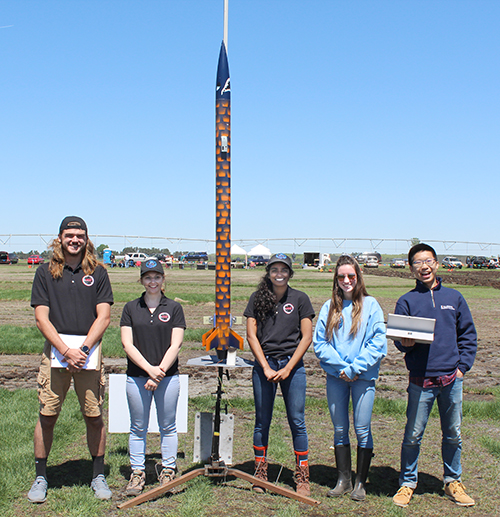 Shivani Ganesh (just right of the rocket) and her teammates at the NASA Space Grant Midwest High-Power Rocketry Competition. (Photo courtesy of Shivani Ganesh.)
Shivani Ganesh (just right of the rocket) and her teammates at the NASA Space Grant Midwest High-Power Rocketry Competition. (Photo courtesy of Shivani Ganesh.)September 11, 2018
For the 150 or so members of the Illinois Space Society (ISS), the organization forms a community on campus where, according to ISS Director Sarah Legg, the “rocket nerds” from Aerospace Engineering (Aero) and beyond can get to know each other: “I've made my best friends here,” she acknowledges. “They're all rocket nerds.” In order to prepare members for careers in the field of space exploration, ISS also offers professional activities, including the opportunity to attend national conferences. To give its members hands-on, technical experience in rockets and space technology, ISS sponsors several different projects, many related to national competitions. Finally, to ensure that the next generation gets as excited about space as the ISS members are, its educational outreach experiences allow members to share their passion for space and rockets with interested youngsters of all ages. One of their biggies is coming up on October 6—Illinois Space Day.
Regarding the sense of community and relationship-building ISS fosters, several Executive Board members claim that ISS has been key in helping them develop relationships. For instance, Aero sophomore Shivani Ganesh, the Educational Outreach director, says she not only made friends, but gained older and wiser mentors through the society.
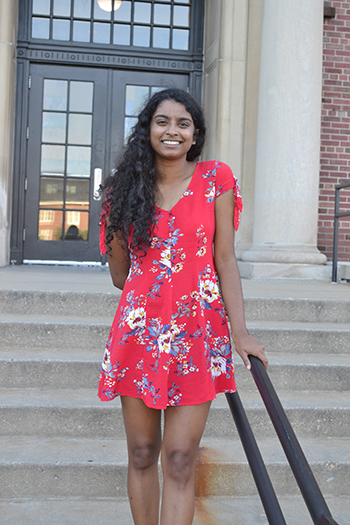 Aerospace Engineering sophomore, Shivani Ganesh, the Educational Outreach director for ISS.
Aerospace Engineering sophomore, Shivani Ganesh, the Educational Outreach director for ISS. Ganesh describes the small town she grew up in as “in the cornfields.” Thus, her high school was also really small (her graduating class had 12 kids!).
“I had a really small-town feel my entire life, so when I came to U of I, I was really afraid of jumping into the crowd and hoping to find some friends. Then I did…through the Illinois Space Society.”
Besides friends, ISS has also provided Ganesh with some ready-made Aero mentors: “wonderful women that are also in my major that can teach me so much about developing not only professional skills, but social skills,” she says. “So that's very important in your future career, because you always want to get along with people.”
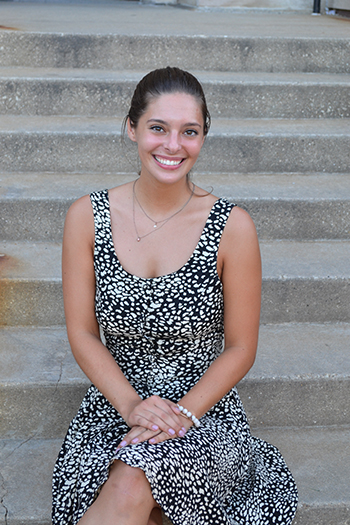 Christine Mehr, Assistant Director in charge of Professional Development for ISS.
Christine Mehr, Assistant Director in charge of Professional Development for ISS.(In an aside, Ganesh shares an anecdote about how she met senior Sara Legg. In spring of 2017, Ganesh participated in a SWE (Society of Women Engineers) Little Sister's Weekend—an overnight event for high school senior girls. Legg was Ganesh’s “big sister” (the undergrad she was paired with to live and hang out with over the weekend). “That was the program that made me decide to come to Illinois for Aerospace,” Ganesh admits. But the story gets even better. Upon arriving on campus in fall 2017, Ganesh attended WIE Orientation. Guess who turned out to be her WIE counselor?! Legg, of course, who encouraged her protégé to join ISS, which she promptly did.
Another goal of ISS is to provide resources to help its members find jobs once they graduate. Christine Mehr, Assistant Director in charge of Professional Development, claims that ISS has “very much impacted my ability to get jobs and internships.” Plus, through ISS, she’s gotten amazing networking opportunities at the two American Astronomical Society space symposiums that the group goes to.
“I've actually been able to talk to the administrator of NASA, one on one, about being a female in aerospace engineering, about our college, about what we can do to get better—which is really cool!” she acknowledges.
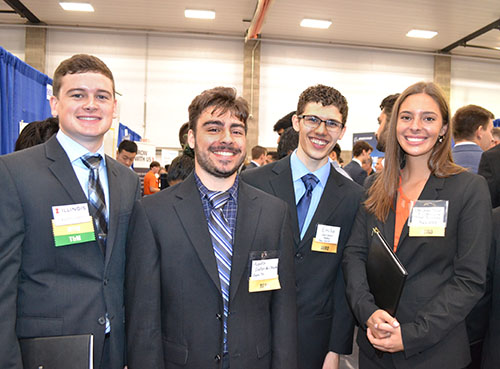 Christine Mehr (right) and several ISS members wait to chat with recruiters from Boeing during the recent Engineering Career Fair.
Christine Mehr (right) and several ISS members wait to chat with recruiters from Boeing during the recent Engineering Career Fair.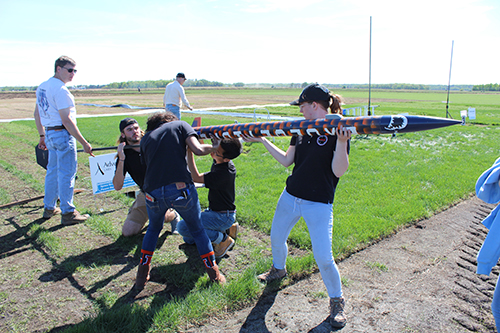 Members of ISS's High-Powered Rocket team set up their rocket for launch. (Photo courtesy of Shivani Ganesh.)
Members of ISS's High-Powered Rocket team set up their rocket for launch. (Photo courtesy of Shivani Ganesh.)
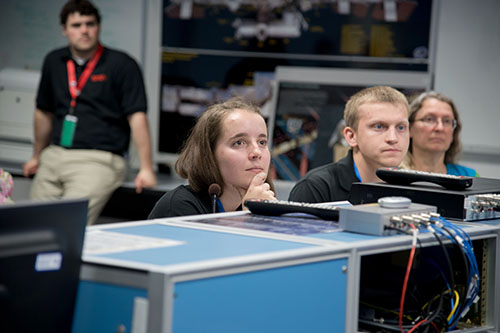 Illinois Space Society Director, Sara Legg (center), as she and other members of ISS’s Micro-g team test the ALMA at NASA’s Neutral Buoyancy Lab. (Photo courtesy of Sara Legg.)
Illinois Space Society Director, Sara Legg (center), as she and other members of ISS’s Micro-g team test the ALMA at NASA’s Neutral Buoyancy Lab. (Photo courtesy of Sara Legg.)Because of the registration fees and transportation costs, only around 16 members can go. “But we've had over 30 people apply before,” Legg explains, “So there's definitely a high demand, and we try our best to get them out there.”
She also appreciates networking opportunities with corporations gained through ISS:
“We're also able to talk to executives, like from Lockheed-Martin and all of these other amazing corporations, and just network and understand current technologies and how we play a bigger role. For me, that's been the best experience because it's really able to develop you as a person.” In fact, the group is planning a trip to St. Louis to talk to Boeing and other corporations there. “So we can hopefully bring more members and give them that experience,” says Mehr.
Another emphasis of ISS is Technical Teams which help members gain expertise in space technology. The three ISS members elaborate on the many benefits of the teams that they’ve experienced personally.
For instance, in her sophomore year, Mehr led the Hybrid team, which involves designing an experimental rocket fueled by a solid fuel comprised of air and wax, along with an oxidizer like nitrous oxide. Combining those two fuels causes combustion and ignites the rocket.
“So we actually just successfully hit 200 pounds of thrust,” she brags, “which is really big. This has been an ongoing project. So, overall it's been really exciting.” This year, they’re actually putting that engine into a rocket and launching it at the annual Space IREC (Intercollegiate Rocket Engineering Competition), the world's largest rocketry competition, held in Las Cruces, NM.
Only about 6 years old, this extremely experimental hybrid rocket technology has one minor glitch—it can explode at any time. “So we actually have to be behind a bunker when we test it,” Mehr confesses. So most likely, until some of the kinks get worked out, NASA or SpacEX won't be using it any time soon. “But it's really exciting for us,” she continues, “because we're able to actually go into these innovative procedures and techniques.”
Sara Legg’s sophomore year, she led ISS’s Micro-g team, which is part of NASA’s Micro-g NExT (Neutral Buoyancy Experiment Design Teams). Not a competition, it's a tool design program.
“So if you ever see the astronauts on the outside of a space station trying to fix things,” Legg explains, “they use certain space tools.” She stresses that they can’t just take regular wrenches or scissors like those found in a tool box and use them up in space. “They design them specifically for astronauts to use so that they don’t cut their space suit,” she explains, “and that way they don't die!”
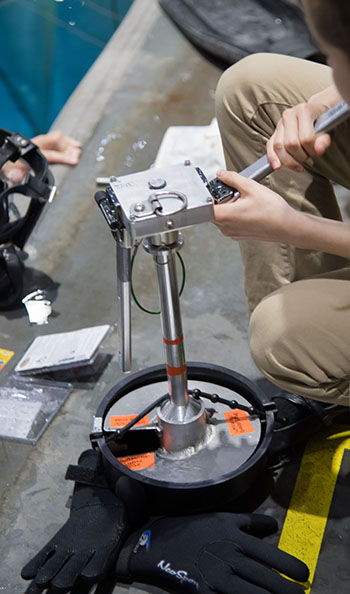 A team member works on ALMA at NASA’s Neutral Buoyancy Lab prior to testing. (Photo courtesy of Sara Legg.)
A team member works on ALMA at NASA’s Neutral Buoyancy Lab prior to testing. (Photo courtesy of Sara Legg.)Her team designed the ALMA (Adaptable Low-Cost Modular Anchor), an anchoring device for micro gravity applications. For example, if an astronaut were on an asteroid or any other celestial body very close to 0 G (weightlessless), they would need a tool anchor that could hold at least 15 pounds of force. So her team designed one, manufactured it, tested it here at Illinois, then took it down to NASA’s Neutral Buoyancy Lab, which simulates 0 G environments, where NASA divers tested the tool out.
“It was a very cool project,” Legg says. “The testing we did down there proved that it was able to stand more than 15 pounds of force,” she says. “And we got really great feedback from the divers. They really liked using our tool, and they gave us feedback if we were to continue doing it.”
In her freshman year, Ganesh had the chance to lead the team that participated in the NASA Space Grant Midwest High-Power Rocketry Competition in Minnesota. The team not only launched the rocket they’d designed and built, but also got to see other teams launch their rockets too. “It was such a fulfilling experience,” says Ganesh.
How'd her team do? They actually got first place. “It was very remarkable,” she admits. “I got the news at midnight, and I was crying. It was probably the most rewarding part of my freshman year.”Even more amazing was that Ganesh says they competed against much “older and wiser” students—advanced rocketry clubs and even grad school groups. She claims the technical experience she gained was quite rewarding:
“I don't think I've ever gone from zero knowledge to that level of knowledge within that timeframe as far as rocketry goes. And overall it has benefited me in every way that I can imagine.”
The seniors, her biggest fans, chimed in: “She was also up against senior design groups from other schools. And it was an all-freshman team, led by a freshman!”
(In another aside, to underscore the depth of the relationships formed in ISS, as the three leaders shared stories about their teams’ achievements, each was as excited about her friend’s achievements as her own, and would sometimes postpone sharing to encourage another to boast about her exploits, or interrupt to praise her friend’s accomplishments.)
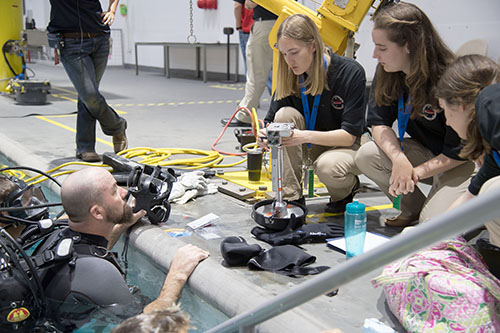 Members of ISS’s Micro-g team confer with a NASA diver while testing the ALMA at the Neutral Buoyancy Lab. (Photo courtesy of Sara Legg.)
Members of ISS’s Micro-g team confer with a NASA diver while testing the ALMA at the Neutral Buoyancy Lab. (Photo courtesy of Sara Legg.)ISS offers additional technical projects: the NASA Student Launch, a national competition where teams build then launch rockets; the High Altitude Balloon pilot project, an effort to launch a weather balloon up to 100,000 feet; and RASC-AL (Revolutionary Aerospace Systems Concepts Academic Linkage), a national competition that challenges teams to develop mission concepts critical for the future of space exploration.
Every fall, campus gets a crop of Aero newbies who haven’t taken a course and, thus, probably know little to nothing about aerospace. ISS recognizes that these newcomers might not have the confidence to join a tech team, so it has several resources to help them acclimate. In fact, Legg maintains that these resources clinched it for her as a freshman.
“I think having multiple resources to help encourage you and give you the confidence to join a society and work on technical projects is so important, and that's what got me my freshman year.”
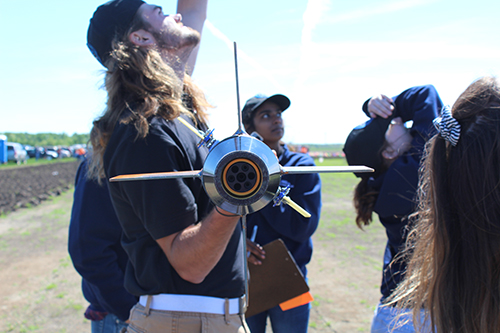 Above: Members of ISS's all-freshman High-Power Rocket team watches another team's rocket being launched during the competition as they wait to launch their own. (Photo courtesy of Shivani Ganesh.)
Above: Members of ISS's all-freshman High-Power Rocket team watches another team's rocket being launched during the competition as they wait to launch their own. (Photo courtesy of Shivani Ganesh.)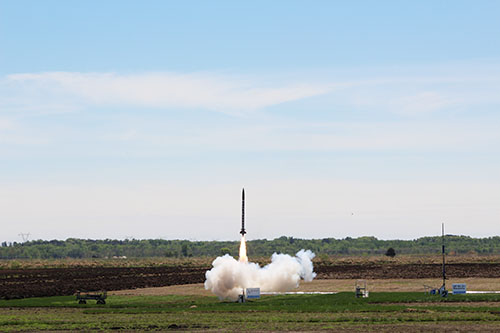
Above and below: ISS's rocket launching and soaring into first place. (Photos courtesy of Shivani Ganesh.)
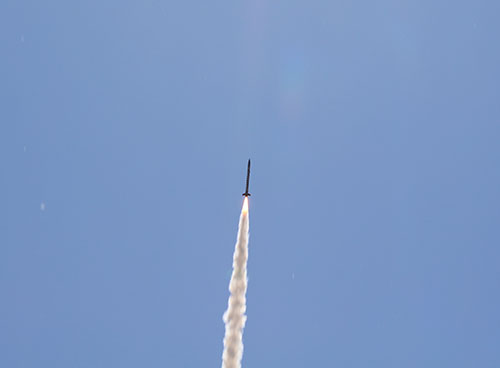
For instance, because getting involved with technical projects is difficult when students don't know anything, Legg says they offer workshops. “That's one thing that we specifically stress here,” Legg insists. “We start at ground zero. Everyone here starts at ground zero. So in order to help mitigate the number of people that are too scared to jump in on a project because they feel like they don't know anything, we offer workshops to get kids going on understanding certain skills that they need.”
They’re also offering a class to introduce students to high-powered rocketry. “It's meant to be a very hands-on class. It's worth credit, but there are no exams. Homework is supposed to be easy. It's meant for them to start learning what everything is.”
Also fairly unique among RSOs, ISS encourages freshmen to get involved in leadership immediately by offering three different freshman positions on the Executive Board. Instead of the usual 10 or so freshman applicants, this year they got 33—the most ever. Freshmen may also apply for the technical manager positions, so they can get real-world experience and start managing a team.
Ganesh, who served in one of the Executive Board positions last year as a freshman, recalls, “So I applied for one of the freshman positions on a whim at 11:58 PM the day they were due,” she admits. “And the rest is history!”
Another important ISS goal is education and outreach—getting the next generation interested in space exploration and rockets. “Getting kids involved so we have more members for the future is a priority,” Ganesh explains. So the group conducts education and outreach activities both on campus and in the community, including schools.
For example, one of ISS’s biggest fall campus outreach events is Illinois Space Day, coming up on October 6th, which features exhibits, demonstrations, and hands-on activities. The biggest activity in the spring is EOH (Engineering Open House), where teams present a number of exhibits, including current technical projects. In fact, ISS has won best exhibit for the Hybrid Rocket Engine two years in a row! Other activities include classroom visits in local schools; a 5-week program called BLAST taught in the Mahomet School District on Tuesdays and Thursdays; providing mentors for the Lincoln Trail Elementary School’s Science Olympiad team; as well as Boy Scout Merit Badge clinics.
ISS also implements some pilot projects, “stealing a name from our technical realm,” Ganesh wisecracks, and hopes to try out some new things in the future. For instance, passionate about recruiting more women into the field, Ganesh and her cohorts envision creating an outreach that targets young girls. “We'd really like to get into creating workshops for middle school girls, who may be losing interest at that time,” she explains. “That is what the statistics show nowadays. And we don't want to lose them, because we need all the people that we can get.”
Plus, ISS envisions teaching global classes for its parent national organization, SEDS (Students of Exploration and Development of Space). Because SEDS has chapters all over the world, ISS would like to connect to those places and hopefully teach classes about what the society has learned.
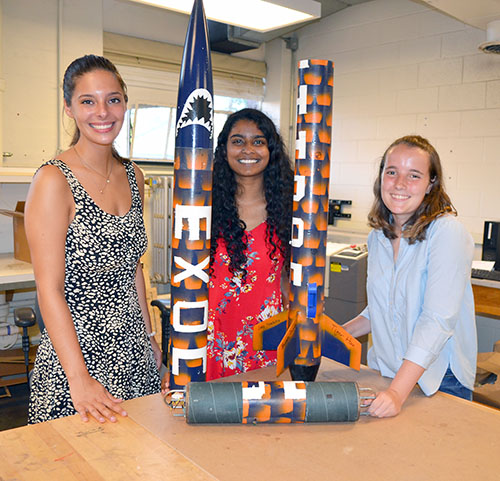 Left to right: Christine Mehr, Shivani Ganesh, and Sara Legg with the rocket ISS's team won first place with at NASA's Space Grant Midwest High-Power Rocketry Competition.
Left to right: Christine Mehr, Shivani Ganesh, and Sara Legg with the rocket ISS's team won first place with at NASA's Space Grant Midwest High-Power Rocketry Competition.Even rocket nerds who are passionate about space need to take a bit of time to relax. So ISS also schedules some social events. For instance, on their calendar is a pool party, Nachos and Muchachos, a camping trip, and a barbeque—and that’s just in September.
Armed with the many skills they’ve gained through ISS, the three Executive Board members are aiming high when it comes to their career plans.
For example, Legg, who is passionate about systems engineering, claims that many startups are “trying to build the next best spaceship, but they're trying to do it quickly. But if you don't have systems in place to check reliability, to make sure you're testing it correctly, to make sure you aren't endangering the lives of others...you [need] have to have the systems in place to make sure that your vehicle isn't going to explode on the launch pad.” So she’s interested in making sure space companies are testing correctly and that their processes are done right. Her dream job is to work on a human factors team for SpaceX or another company, focusing on equipment needed for interplanetary missions or to space station.
Ganesh says she came to Illinois to pursue aerospace engineering because she’s always been interested in space exploration. Her dream job ever since she was six has been to be the flight director for a human space flight mission. How would a six-year-old even know there’s such as thing as a flight director? During a trip to Disney World, she and her parents stopped by Kennedy Space Center, where she had an epiphany.
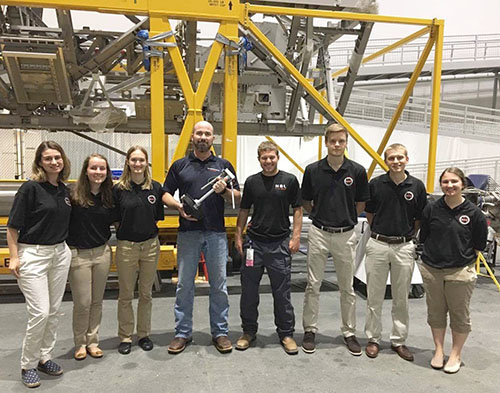 Members of ISS’s Micro-g team at NASA's Neutral Buoyancy Lab. (Photo courtesy of Sara Legg.)
Members of ISS’s Micro-g team at NASA's Neutral Buoyancy Lab. (Photo courtesy of Sara Legg.)“Most of the time I was an uninterested kid,” she explains. “I just wanted a souvenir. Then they took me into the control center. It was dimly lit, very ominous. As soon as I saw the title of flight director, I felt as if that title was very important for me. Ever since then, it's just been figuring out what that entails and what I need to do to get there.”
Regarding her goal, she adds, “I think I have a very romantic outlook on space exploration. So I really hope that we can make the human species an interplanetary one, and I think this is the way if you want to do that.”
During Mehr’s internship with Spirit Aerosystems this past summer, she figured out something unique about herself: She loves to break things! A career that would allow her to do that is a composites test engineer. “I found out freshman year that I was obsessed with composites of all types,” she explains. So as a test engineer, people would give her different types of composites they’d developed, which she would break, then tell them what broke, how, then work with them to improve them.
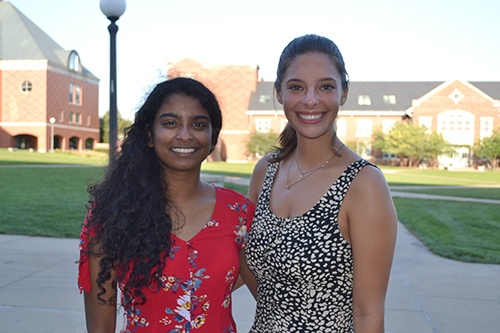 Left to right: Shivani Ganesh and Christine Mehr.
Left to right: Shivani Ganesh and Christine Mehr.“Not only did that satisfy my technical love of aerospace,” she explains regarding her stint as a test engineer, “but that also allowed me to communicate with all types of engineers and business people. So I would relay information from research and design engineers to project managers.” So her dream job would be to find a test engineering lab that she really loves, do test engineering for a few years, then advance into the project management level. “So then I'll be able to work with higher ups to get us more time and equipment. And then just relay information back and forth within the aerospace area.”
Regarding benefits gained from being a member of ISS, Legg claims that it has been “one of the most important things of my college career,” she says. “I came in as a freshman and wanted to join everything. Over the years, I've realized the amount of value this club has.” For instance, while some RSO’s offer either professional or technical opportunities. ISS does both. “Illinois Space Society has definitely given me experiences. I interned at SpaceX last summer. If it wasn't for the projects that I worked on with Illinois Space Society, the people that I met with Illinois Space Society, I don't think that I would be in the position that I am today,” she says.
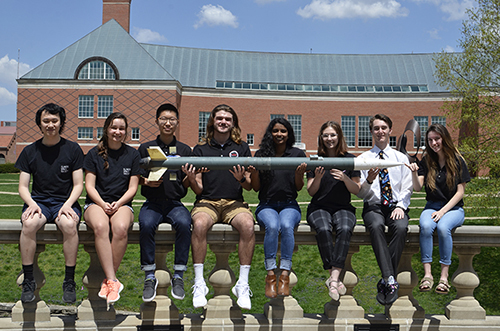 Members of the ISS High-Power Rocketry team show off their prize-winning rocket on Bardeen Quad. (Photo courtesy of Shivani Ganesh.)
Members of the ISS High-Power Rocketry team show off their prize-winning rocket on Bardeen Quad. (Photo courtesy of Shivani Ganesh.)Story by Betsy Innes, Communications Specialist, I-STEM Education Initiative. Photos by Betsy Innes, unless otherwise noted.
For more articles about Aerospace Engineering, please see:
- Aerospace Engineering Camps Seek to Ignite High Schoolers’ Interest in Aerospace, STEM
- Aerospace Engineering Junior Suzanne Peterson Returns to G.A.M.E.S. Camp
- Illinois Robotics in Space Launches Conversation on NASA and Member Experience
- Yankee Ridge After-School Program Takes Off Under Guidance of Illinois Aerospace Engineering Students
- During I-STEM Summer Camp, Urbana High School Students’ Understanding of Aerospace Engineering Soars
More: Aerospace Engineering, Undergrad, 2018
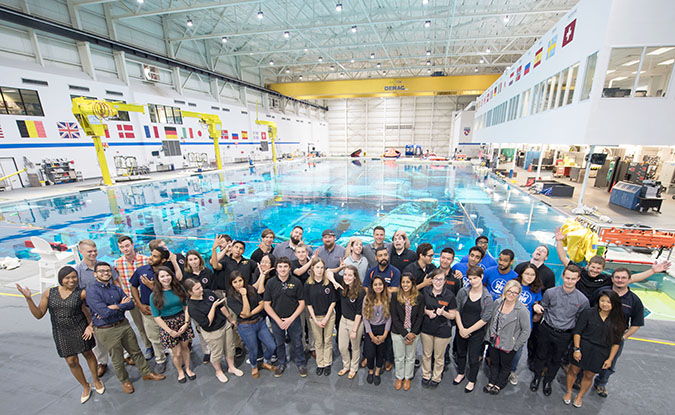 Members of ISS’s Micro-g team along with the team at NASA's Neutral Buoyancy Lab. (Photo courtesy of Sara Legg.)
Members of ISS’s Micro-g team along with the team at NASA's Neutral Buoyancy Lab. (Photo courtesy of Sara Legg.) 












.jpg)
















